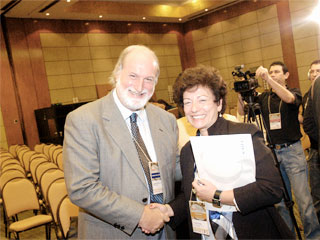Discrimination is wasteful and makes a loss
Diversity can be a competitive edge for the Brazilian companies
Any type of discrimination, besides violating human rights and the Federal Constitution, is wasteful for the private sector. This is the opinion of Laís Abramo, director of the International Labor Organization Office in Brazil, one of the debaters at the Instituto Ethos’ 2007 Conference theme panel "Encouragement of diversity and equity in the labor market".
The director justifies her opinion based on the premise that, if a company does not take competence into account as a hiring criterion, but the applicant’s gender or race, it will have production problems and, consequently, profit problems. "It’s a waste of talent and, therefore, of money." The key issue in gender discrimination, said Abramo, is that companies see women as a risk, "due to current, prospective or likely pregnancy."
Discrimination is multifaceted, insidious, complex, and manifests itself in several, many times subtle, forms. "Eliminating it is of everybody’s interest; nevertheless, it’s even harder than eliminating child labor," compares Abramo.
The 2005 edition of the survey "Social, Racial and Gender Profile of the 500 Brazilian Largest Companies" has figures that prove the gap in the distribution of positions between men and women. In management positions, there are 69% men and 31% women. "The gap is big, but shows an evolution compared to the previous survey, carried out in 2003, when the rate of women with middle management positions was only 18%," said Paulo Itacarambi, executive-director of Instituto Ethos. As for senior management, there are 89.4% men against 10.6% women. "Another worrying rate is that of people with special needs. They total only 2% of companies’ staff," adds the executive-director.
According to Magnus Ribas Apostólico, superintendent of Labor Relations at Federação Nacional dos Bancos (Febraban), just fighting discrimination is not effective; promoting diversity is also necessary. "A good example is found in the banking sector. Among these organizations, 52% keep programs to value vulnerable groups, and 68% to value people with special needs."
Apostólico believes a company with programs that value diversity has a good image in the society. However, Maria Aparecida Silva Bento, executive director of the Centro de Estudos das Relações de Trabalho e Desigualdades (Ceert), pointed out that 53% of the companies hire people with special needs for social justice and 47% for their competence.
Bento thinks the private sector should carry out continuous education. "Companies should change the slogan ‘we do not discriminate’ for ‘we have such and such affirmative action projects’."
The first step to improve problems is to acknowledge them, said Nilcéa Freire, minister of the Special Secretariat of Policies for Women (SPM). "I have experienced this when I was president of Universidade Federal do Rio de Janeiro and a young man asked me how many black professors worked there. Only then did I realize how few they were and, instead of trying to hide the problem, I gathered my team and started implementing the "política de quotas" (affirmative action program in universities)," she said.
According to the ministry, the private sector does not have to make large investments to minimize the problem; awareness and sensitivity will do better. "It’s important, for example, to listen to the employees before deciding on the time of a workshop. It’s no use offering training if women can’t participate because they have to pick up their child at school. This will have an effect on the female employee’s qualification."
The SPM has developed the Programa Pró-Eqüidade de Gênero (Gender Equity Program), initially for public sector companies, to which 16 companies have subscribed. Out of these, eleven were granted the gender equality seal for having achieved all the targets agreed with the special secretariat. "The novelty is that, from January 2008 on, the private companies will also be accepted in the program," said the ministry.
Fonte: Instituto Ethos

> Petrobras Watch the Petrobras coverage
© Copyright 2007, Instituto Ethos de Responsabilidade Social Empresarial. Todos os direitos reservados






